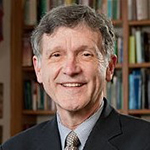 By Bill Leonard
By Bill Leonard
Each January for several years, I’ve joined a group of theology students for a Wednesday visit to the Haywood Street Congregation in Asheville, N.C. I can’t help but write about it, since the experience is always “transforming,” as students inevitably describe it.
The students come from various theological schools, gathering at High Pastures Retreat Center in Burnsville, N.C., for an 11–day experiential learning course entitled “Fierce Landscapes: Listening to the People of Appalachia.” Partially funded by a grant from the Appalachian Ministries Educational Resource Center, seminarians study the region’s culture and religion while engaging churches, community agencies, schools, farms, museums and other cooperatives in three mountain counties — Yancey, Madison and Buncombe. This year’s 17 students came from Wake Forest School of Divinity, Baptist Theological Seminary at Richmond, Wesley Theological Seminary in Washington and Andover Newton Theological School in Newton, Mass.
The Haywood Street Congregation is a faith community housed in a former United Methodist church facility just off Interstate 240 in downtown Asheville. Amid many weekday ministries, the congregation gathers on Wednesdays for a noon meal followed by worship. Lunch, often prepared by chefs from some of Asheville’s best known restaurants, is offered gratis to the church’s primary constituency, the urban homeless in North Carolina’s largest mountain town.
At worship, the congregation casts a wide net, with persons who reflect the church’s own mission statement reading:
“Haywood Street Congregation is a church where all people, without exception, are welcomed and affirmed of their sacred worth. We strive to follow the example of Christ who sought relationship with individuals that others dismissed as not worthy of redemption. We embrace diversity in the community and the world, including the diversity of race, ethnicity, sexual orientation, gender identity, age, faith history, ability and disability, housed and yet-to-be-housed, economic status, marital status, health status and family configurations. We recognize differences of opinion and seek to understand in light of Christ’s teachings. We are committed to reconciliation with one another, and to the reconciliation of each person with God. We are an Open and Affirming, Reconciling United Methodist congregation.”
This year’s statement is an even more expansive declaration than the one circulated last year, indicating that Haywood Street remains a work in progress, ever enlarging its commitment to people on the margins. It was the phrase “yet-to-be-housed” that caught my attention and imagination. For this urban congregation, the term “yet-to-be housed” captures their commitments beyond the word “homeless,” a promise that requires both immediate action and eschatological anticipation. It moves beyond inevitable reality to essential hope, challenging yet another label laid on those who have no immediate place to lay their heads. Before mocking it as a banal sign of “political correctness,” a term of derision in today’s poisoned political environment, we might rather see it as an attempt to humanize those all too often left permanently “unhoused.”
This call to inclusion of persons whatever their strengths and struggles strikes me as something of a counter-culture gospel, an alternative witness in this election year when public rhetoric and private ridicule by certain politicians and other publicly privileged sorts seem to exclude or question those whose lives and existences are often “dismissed as not worthy of redemption.” Think of it: what if we as a nation, or at least as a Christ-claiming church, began with that description of mission and constituency? What if addressing the “yet-to-be” became an overpowering promise and motivation for who we are as the people of God?
The Wednesday service ended with Holy Communion, led by a minister who spoke of Christ’s body and blood, life and death, and called us to come forward to receive bread and cup. He added that gluten-free bread was available for those who needed to take it. No sooner had he offered that Communion option than a not-yet-housed individual in the congregation blurted out: “I don’t want to interfere, but what should you take if you have high blood pressure?” At the Table and in the world, body and blood have all kinds of special needs to which the church is called to respond. At the Haywood Street Congregation you never know where the sermon is going to come from.
Prior to Communion, my old friend Jim McCoy, guitar in hand, led the congregation in a moving chant of confession, written by Tennessean David Butzu. We sang the words together as Jim lined them out:
I confess
I confess
To Almighty God
And to you, my brothers
I confess
I confess
To Almighty God
And to you, my sisters
That I have sinned
through my own fault
In my thoughts
and in my words
That I have sinned
in what I’ve done
And in what
I have failed to do
And I ask you
and all the church
To pray for me
Pray my sisters
And I ask you
And all the saints
To pray for me
Pray my brothers
And I ask you
To pray for me
To the Lord our God.
Confessing our sins together that day at Haywood Street, we knew that while Christ’s kingdom remains not-quite-yet, it can still come oh-so-near.
